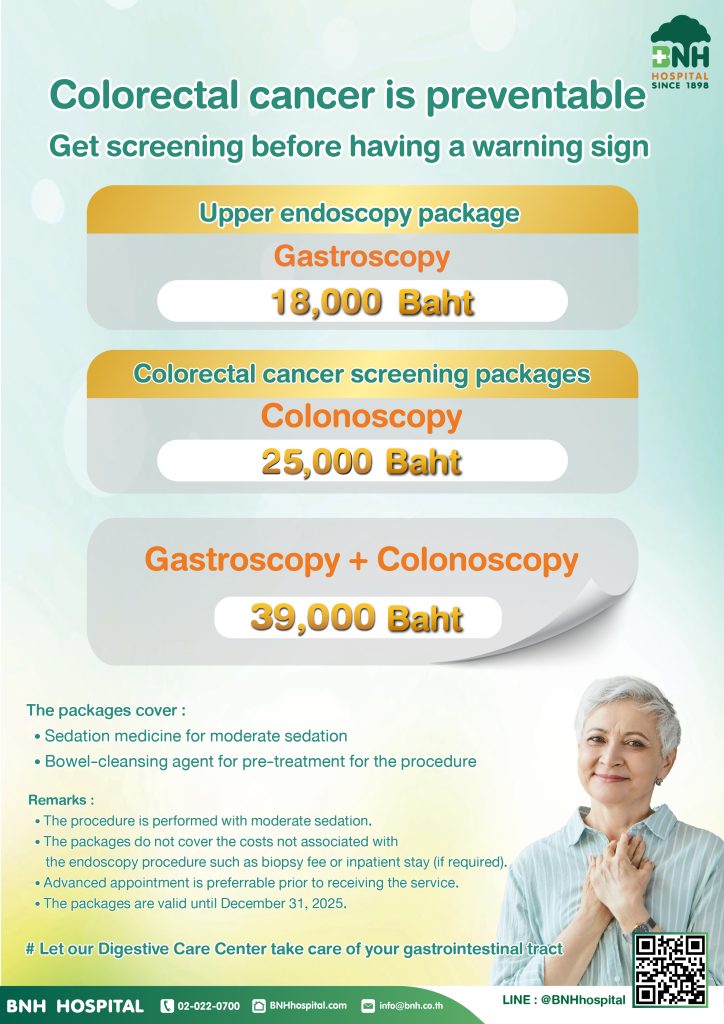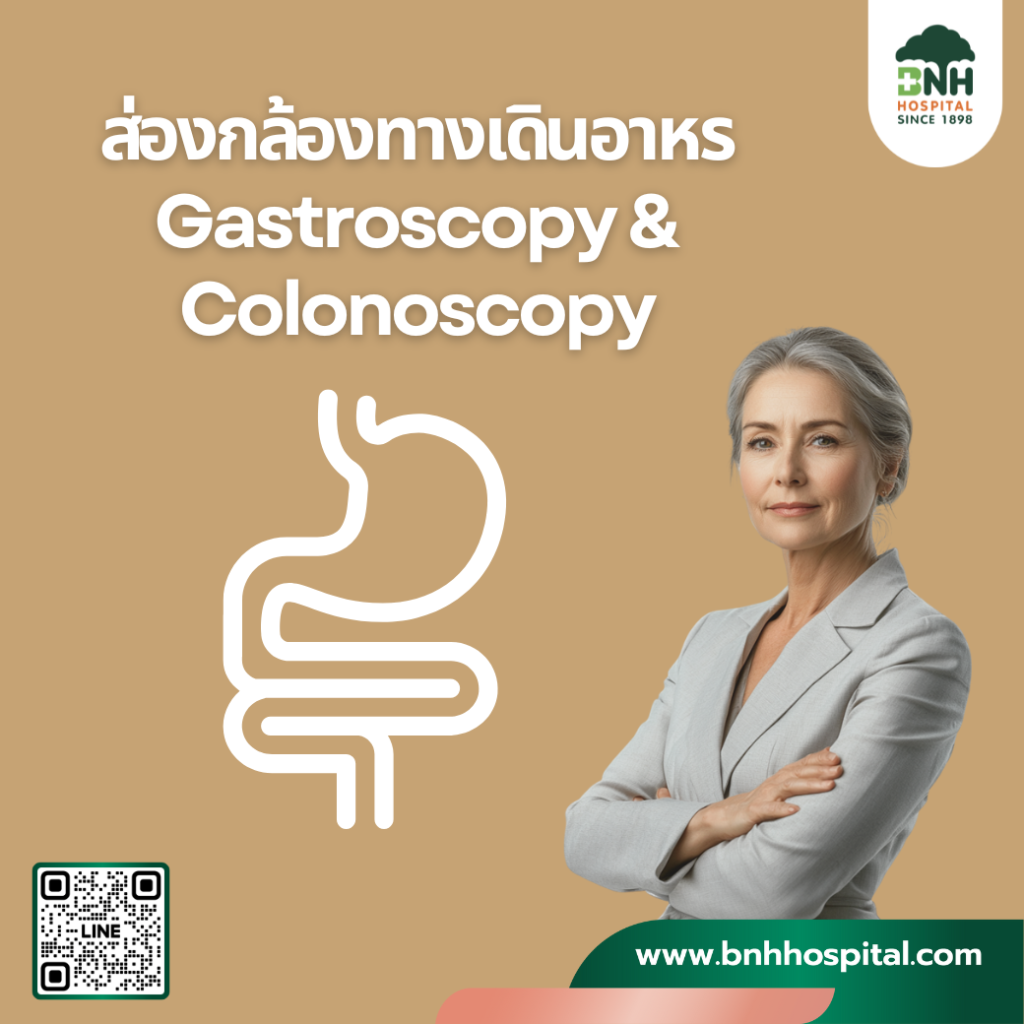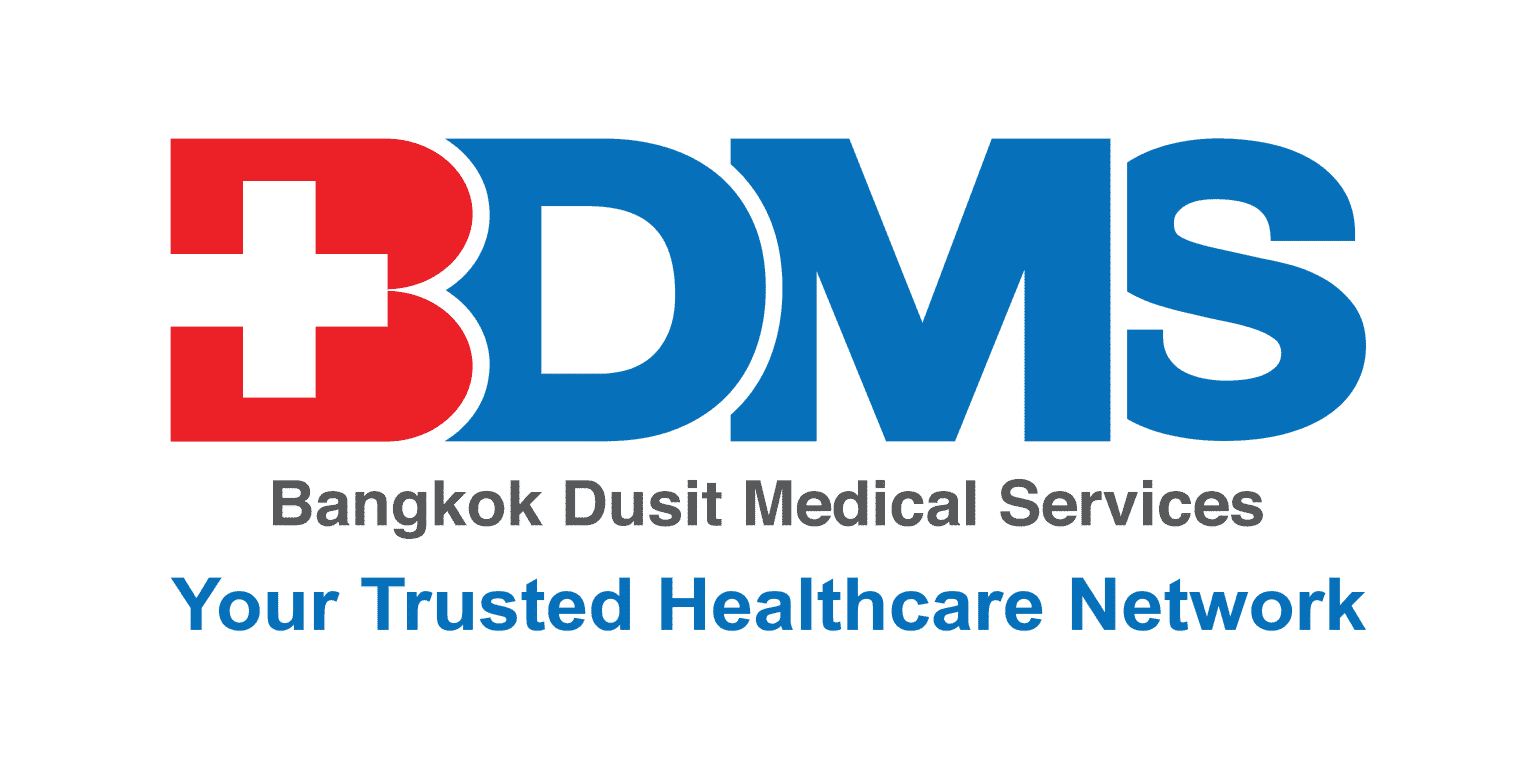
Click to read information about colon cancer according to the topic you are interested in:
Colon cancer (CA Colon) is another dangerous cancer that often comes without warning, which occurs at the end of the gastrointestinal tract. The statistics show that colon cancer is the second most common cancer in males after liver cancer, and third most common in females after breast and cervical cancer.
Colon cancer can also be inherited. Although it is most commonly found in those aged 50 years and older, nowadays it has been found that the incidence of colon cancer among younger people is increasing. Often, there are no symptoms at first. In general, by the time the patient realizes it, it is usually in stages 3 – 4, making it difficult to treat with a high chance of death.
Did you know that the sooner you realize you have colon cancer, the better? Because there is a higher chance that it can be cured.
Colon cancer and warning signs
Do you have any of these warning signs of colon cancer?
- Abnormal excretion (constipation alternating with diarrhea)
- Incomplete bowel movements / difficulty passing stools or intestinal cramping / rectal pain
- Bloody stools
- Chronic abdominal pain
- A lump found in the abdomen
- Other unknown causes, such as physical exhaustion, loss of appetite, or weight loss
Or if you have any of the following risk factors:
- Aged 50 years or older
- Family members with a history of colon cancer
- A polyp found in a previous colonoscopy
- Ulcerative Colitis
- Behaviours that increase the risk of colon cancer, such as regularly consuming foods that contain carcinogens (red or grilled meats, high-fat and low-fibre foods, alcohol and smoking).
Causes of colon cancer
Colon cancer is an abnormality in the colon’s tissue cells, characterized by rapid proliferation of the mucosa. When the cells become abnormal, they form polyps or tumours in the intestines and gradually grow larger, until they develop into colon cancer. These cancer cells will then spread to the muscles and parts of the intestine through the lymphatic and blood vessels, and then spread to other organs of the body, such as liver or lungs.
At present, the exact cause is still unknown, but studies have found that the more people eat fruits and vegetables, the lower the risk of colon cancer.
Normally, the chance of developing colon cancer increases with age. That is, the older you get, the higher the risk. Nowadays, Thais are emulating the lifestyle and food consumption habits of Westerners, and as a result, the rate of colon cancer in the Thai population younger than 50 years has increased.
Colon cancer can be detected with a colon and rectal colonoscopy. The survival rate and chance of being cured from this disease often depend on the stage at which it is detected. We can divide colon cancer into 4 stages as follows:
Stages of colon cancer
Stage 1 is the stage where there has not been any further spread, which can be treated with surgery and can be cured. The survival rate is 80-95%.
Stage 2 is the beginning of the spread. Cancer cells enter the muscle layer of the intestines, where they can spread to the intestinal membrane, other tissues, or nearby organs. The survival rate is 55-80%. Treatment requires surgery along with chemotherapy. This will increase the chance of cure by 80-90%.
Stage 3 is the stage where it begins to spread to the lymph nodes. For treatment, as many lymph nodes as possible must be surgically removed and chemotherapy used to keep the cancer from recovering and further spreading. The survival rate is 40%.
Stage 4 (metastasis) is considered a relatively severe stage because cancer cells have spread to various organs, such as the liver, lungs, or bones. Treatment at this stage requires surgery by removing the affected organs and undergoing chemotherapy as well. There is only a 10% survival rate in stage 4. If treatment is continued, the chance of being cured is equivalent to stage 3.

Why screen for risk of colon cancer?
Colon cancer is one of the leading causes of death worldwide. Early detection and appropriate treatment at an early stage can increase survival rates.
According to 2020 statistics from the National Cancer Institute, 72.7% of patients are generally aware that they have colon cancer in stages 3 – 4, which makes colon cancer one of the leading causes of death threatening the lives of Thais.
Adenoma polyps were often found, which are polyps that have the potential to develop into colon cancer. The data are as follows:
- Adenoma detection rate = 55.54% from 2018-2021, accounting for 1 in 2 cases examined
- And the detection rate of colon cancer = 2.46%, accounting for 1 case in 41 cases examined.
* Statistics on the rate of finding polyps, in addition to arising in abnormalities of the patient. Another important factor is the expertise of the medical team that performs colonoscopies, together with modern tools as well, because not detecting a polyp may not mean there are no polyps at all. Therefore, choosing a doctor with expertise together with modern tools are another important factor. If polyps are detected at an early stage, they can be treated immediately to reduce the death rate.
3 ways to treat colon cancer
1. Surgery
The main treatment for colon cancer is surgery to remove the diseased portion of the colon and lymph nodes. Sometimes, if the cancer is very aggressive or it’s a cancer of the distal colon next to the anus, surgery may be necessary to make an artificial anus to remove the remaining end of the intestine and open it through the abdomen to allow stools to exit.
2. Chemotherapy
Chemotherapy is the administration of chemical drugs. This may be given before surgery and/or after surgery with or without radiotherapy. The use of chemotherapy depends on medical indications and does not have to be given to every patient. The doctor will consider it on a case-by-case basis.
3. Radiation (radiotherapy)
Radiation is a treatment combined with surgery that may be given before or after surgery. This depends on the medical indications on a case-by-case basis. The doctor will evaluate the nature of the tumour’s spread and the chance of it spreading to the lymph nodes.
To treat colon cancer, there will be a team of doctors in various fields, such as surgeons, radiologists, and cancer specialists. Together, they plan for the best and most appropriate treatment for each patient.
Which treatment the doctor chooses depends on how likely the cancer prognosis is, and whether it has spread. It is also necessary to evaluate the patient’s physical condition to determine which method is most suitable.

FAQs
Q: What happens if a polyp is found?
A: The doctor can remove the polyp immediately through a colonoscopy and send it to be examined for further diagnosis.
Q: If a polyp is found and surgically removed, does it cure the cancer?
A: The data show that regular colonoscopies and polyp removal can reduce the incidence of colon cancer. A colonoscopy is considered an examination that greatly reduces the risk of colon cancer.

Summary
Colon cancer is a type of cancer that tends to be increasingly detected in the Thai population. It is found to be the number 2 cancer in males and number 3 in females, especially in those over 50 years of age who have a history of abnormal bowel movements, and there is a higher risk in populations with a family history of colon cancer. Currently, colon cancer screening through colonoscopies is the standard and least dangerous examination method because it does not hurt, it does not take long, and does not require a long recovery time. If polyps are found during the colonoscopy and they are the type that have a chance of becoming cancer, the doctor can remove the polyp immediately. It can be said that this is another way to treat colon cancer in its early stages.

Gastroscopy & Colonoscopy Package
Another dangerous cancer that often appears without warning signs is colorectal cancer.
” Don’t be complacent! Colon cancer can be cured if detected at an early stage. “
Gastroscopy 18,000 THB
Include
- Doctor’s fee for gastroscopy
- Endoscopy room fee
- Preparation room fee
- Laxative medication fee
- Anesthesia fee (sedation)
- Medical equipment and instrument fee
- Hospital service fee
Colonoscopy 25,000THB
Include
- Doctor’s fee for colonoscopy
- Endoscopy room fee
- Bowel preparation room fee
- Laxative medication fee for bowel preparation
- Anesthesia fee (sedation)
- Medical equipment and instrument fee
- Hospital service fee
- Recovery room fee
Gastroscopy + Colonoscopy 39,000THB
- Doctor’s fee for gastroscopy
- Doctor’s fee for colonoscopy
- Endoscopy room fee
- Bowel preparation room fee
- Laxative medication fee for bowel preparation
- Anesthesia fee (sedation)
- Medical equipment and instrument fee
- Hospital service fee
- Recovery room fee
- Please make an appointment in advance.
- This price includes doctor fees and hospital service fees.
- This package includes an anaesthesia for the endoscopy (moderate sedation).
- This package does not include a general anaesthesia fee conducted by an anaesthesiologist, if required.
- This package does not include additional fees other than for the endoscopy itself, such as additional biopsy tests, room and board in the case of inpatient stay (admission), and medication and treatment of other illnesses.
Service Location: Digestive Care Centre, 3rd Floor, Zone B, BNH Hospital
Operating Hours: Monday–Sunday, 8:00 AM–5:00 PM.









